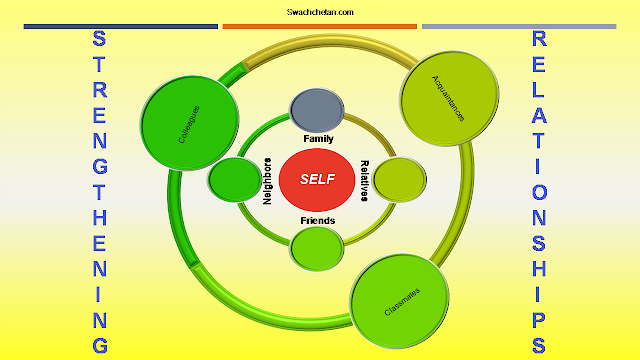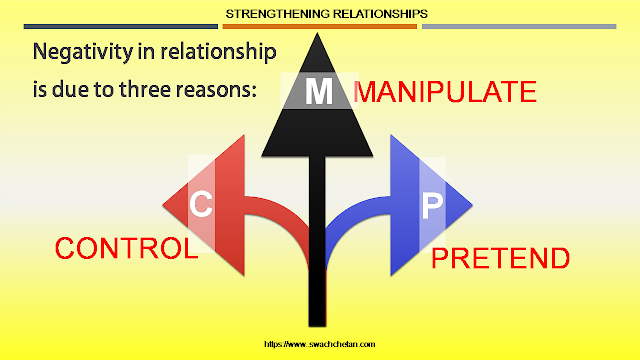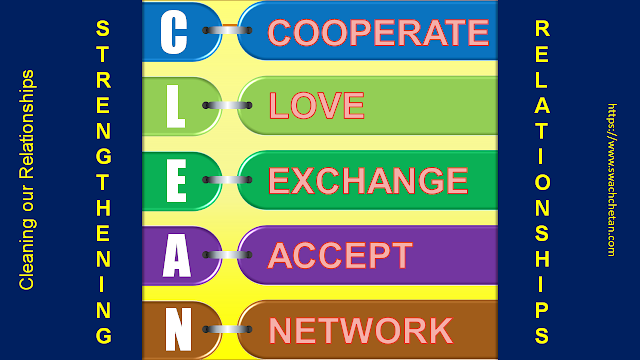Strengthening Relationships
Living with others is
not so easy unless we can master the art of human relations. Each relationship is so precious that we
cannot ignore the complexities it brings whenever we form a new
acquaintance. We must move towards
healthy relationships so that our lives become meaningful and worthwhile.
Developing a new
relationship is like developing a tumor.
The tumor could be cancerous or benign.
If it is benign, then there is nothing much to worry about. A cancerous cell multiplies itself and starts
attacking other healthy cells. Unless
its growth is arrested, the tumor spreads all over the body and the person’s
life is in danger.
Similarly, when a new relationship
is formed we tend to ignore it without trying to find out whether such a
relationship could destroy our well-being.
Consider the following situations where we see nothing much out of the
ordinary:
A father is angry at his
son for not obeying his instructions.
A boss is displeased about
his employee’s independent decisions.
A friend ignores messages.
A daughter-in-law does not
get along well with her mother-in-law.
A mother is depressed
because her family does not care for her.
A
colleague suddenly stops talking to her co-workers.
These and many more such
situations are regarded to be part of our daily life and we do not give
importance to making modifications when they occur. Just like cancer cells, these
negative interactions spread so fast that it hamper our other relationships.
We ignore kith and kin
and give more importance to friends and colleagues. We ascribe greater value to
a newer relationship. We show negative emotions far more easily to people who
are closer to us than to others. We expect people who are closer to us to agree
to whatever we say or do without finding out whether we are right or not! We
somehow think showing our love for somebody is our weakness
We take older relationships for granted and are always
interested in new relationships. A new relationship can either sustain existing
relationships or destroy existing relationships. Situations
that look normal may destroy our well-being. Over a period, normal relationships turn negative as we
involuntarily start manipulating, controlling, and pretending (the MCP of
Relationship).
Manipulation
We usually allow others
to manipulate us or we try to manipulate the people around us. We rarely understand that such manipulation
does not last long. Let us say I want
something from my friend. I start
manipulating him to get what I want. I
show him my best side, I agree to whatever he says and be very nice to
him. If he allows himself to get
manipulated, I like him. If he resists
such manipulation, then I become angry or aggressive at him.
Children learn to
manipulate their parents very well. If a
boy knows that his mother does not like him throwing temper tantrums on the
street, he starts doing those more on the street. He knows his mother is afraid of the
displeasure of bystanders and will give him whatever he asks. The mother keeps saying she does not like his
behavior yet rewards him whenever he does so.
Control
We love people whom we
can control. A boss likes the
subordinate whom he can control the most.
We want a spouse to agree to whatever we say. We like the child who
obeys us. When people disobey or question our rules and regulations, we begin
to distance ourselves from such people.
Pretend
We wear masks of pretense
every time we interact. We hide our wishes
and desires to fulfill others’ wants. We
say things we do not mean and we agree to almost everything someone says out of
fear of losing our relationship. When we keep dancing to somebody’s tunes, we
do not know what to do when several people start playing different tunes at the
same time or when no one plays any tune.
Negative things happen
automatically while positive things need our intervention. It is automatic to fall from a bicycle
whereas we need to learn how to balance in order not to fall from the
bicycle. Once we learn how to balance, we
can ride on any cycle or two-wheeler.
Hence, learning is important to remove the obvious negative effects of
nature. Comparing this to our
relationships, we find that our interactions become stale over some time
because we assume that our relationships grow without our intervention. We tend to brush aside the displeasure that
is caused due to our faulty interaction.
Gradually, one fine day, we find that we have lost a relationship. This proves very costly not only for our
growth but also for our happiness.
The solution lies in
being CLEAN. We keep our bodies, our
hands, legs, and things around us clean.
Why do we not try to clean ourselves from the inside? We tend to keep our displeasure together for years. For instance, a man hates
another man who was once a friend because the latter had called him names ten
years back. Imagine what would happen if
we did not clean our bodies for ten years!
The essence of being
clean internally lies in having a positive relationship. The letters in the word CLEAN represent an
important aspect of a positive relationship.
C = CO-OPERATE
The need to co-operate
is essential when we live together. Our desires,
wants, and options are less important when we have to achieve collective
goals. Each of our families needs to
work as a single unit to derive happiness.
Jealousy, comparison, and competition have no
place in relationship building. Collective thinking and collective goal
formulation lead to collective achievement. If you cannot cooperate with the
people you know, then it becomes difficult. It is hard not only for you but
also for others in your daily transactions. Co-curricular and extra-curricular
activities help you in learning cooperation. (See 12 C’s of Cooperation Cycle)
L = LOVE
Loving another person is
showing positive regard for that person’s existence. Such regard should be without
conditions. The moment we put conditions
on our love we start manipulating or controlling our loved ones.
In
whom have we seen unconditional positive regard? Not judging, not criticizing,
not ridiculing, and not advising. It looks tougher but all of us had such a
love when we were too young. As young infants, we do not choose, prefer, or
compare our parents. We accept them as they are but how come we do not do the
same when it comes to our children or others?
E = EXCHANGE
Sharing one's ideas, desires, thoughts, feelings,
perceptions, actions and goals is most crucial in nurturing healthy
relationships.
Give
and Take is a business relationship, not a social one. In a social
relationship, you give and enjoy the role of giving. You receive only because
you are given something with kindness. You do not demand just because you have
given something. You give something (that you have more of or you are stronger
in) to somebody and receive something (that you need) from someone else!
A = ACCEPT
We must learn to accept
others as they are rather than as they should be. The more we expect things from someone the
greater will be our displeasure in dealing with that person.
Accept
people as they are because you cannot choose your kith and kin. The more you
try to change them, the more they will try to change you. When you attempt to
reject them, they start rejecting you. Their misgivings, their failures, and their
misfortunes are not under their control. Nor are they under your control and
hence accepting them will only help your relationship.
N = NETWORK
Relationships grow
stronger when we build a network around the people we know. Bonding happens when strangers become
friends. It becomes more difficult to
lose relationships when mutual coexistence occurs.
Build
a strong network with people having a similar value system. Differences of
opinion do not matter as long as there is concurrence in values. When someone
tries to weaken the network, try to isolate the individual from your network. Include
people in the network, even if they are from different backgrounds. The
stronger and sturdier the network, the healthier the relationship.
Signs of Unclean
Relationship
Spending time with
family members becomes more painful than spending time with friends,
acquaintances, and strangers. Within five minutes, a casual conversation with a
family member turns into an argument. We would rather spend a whole day with
friends than spend a few minutes with family members.
We have the lowest
tolerance level with people with who we are closer. Though our love for our
family members is abundant, we do not know how to show it. We rather trust a
stranger than the people whom we know.
In real need, it is the
family and friends who come with us to be together. We are made to believe that
staying at home is more painful and that enjoyment is always outside the home.
Coronavirus has taught
us that in emergencies, we have to live with our family members and not anyone
else. Many people consider that this is quite painful as they have been
indoctrinated to believe that living at home is painful.
They think that they are
suffering because they have no independence to go wherever they want to. If
they don’t know how to be independent in their own home, where else can they
have freedom?
Obeying someone’s rules
is not freedom; thinking and forming your code of conduct is. If we can’t be
happy with our people, then we don’t know how to be happy in the first place. We
always think that enjoyment is possible only if we step outside our homes. We
go to pubs, malls, parties, cinemas, etc. to obtain entertainment; these are
enjoyable because we do it once in a while.
Make family your
priority because they are the reason you are doing whatever you are doing. People
who stay away from home will realize the importance of living with family. But
by the time they realize it, they will have forgotten why they are living. If
you are uncomfortable with your people, then learn the Eight Interaction Skills to live together.
The purpose of CLEAN
Relationships
Unhealthy relationships
grow similar to garbage. We need not
advertise for people to come and drop their waste at any given place. All it needs is for us to drop some of our waste
anywhere. It starts growing
automatically. Without knowing we start
manipulating, controlling, and pretending in our relationships.
Contrarily, healthy
relationships are like growing a plant.
We must water it, look after it, remove weeds, and provide sunlight. Growing a plant takes more time and effort
compared to the growth of garbage.
Similarly, we need to invest our time and effort in building our
relationships. We need to come CLEAN and
make sure we cooperate, love, exchange, accept, and network to continue a healthy
relationship.
Transforming Difficulty to Ease















Please do not include any spam links in the comment box.